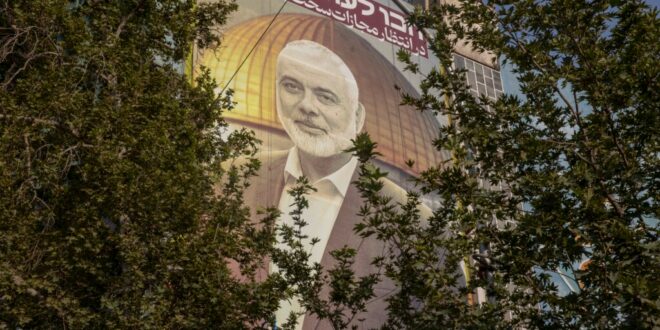Latest Developments
A hidden explosive device smuggled into his Tehran guesthouse months ago killed Hamas political chief Ismail Haniyeh, The New York Times revealed on August 1. Unnamed sources told the Times that the bomb was placed two months ago inside the residence, which is secured by the Islamic Revolutionary Guard Corps (IRGC), and was remotely detonated on July 31. “The explosion shook the building, shattered some windows and caused the partial collapse of an exterior wall,” the Times reported, citing two IRGC officials.
Haniyeh was in Tehran for the July 30 inauguration of Iran’s new president, Masoud Pezeshkian. Before dawn on July 31, a presumed Israeli attack on his guesthouse killed the terror chief as well as one of his guards. Israel has not admitted or denied responsibility for the assassination.
Expert Analysis
“Once again, Iran’s security services have proven themselves to be agents of domestic repression more than anything else. A reported bomb placed where a leader of the regime’s Axis of Resistance was staying shows not only incompetence and the potential for coordination by disgruntled security elements with Israel, but also underscores the comment made by a former Israeli intelligence minister who said officials in Iran should fear for their lives.” — Behnam Ben Taleblu, FDD Senior Fellow
“Haniyeh’s death will serve as a reminder for the regime in Tehran of the humiliating security lapses within its critical institutions, particularly the IRGC intelligence and the Ministry of Intelligence. As the Islamic Republic scrambles to address the breach, it is likely to resort to preserving its reputation with its support base through harsh rhetoric and symbolic, imprecise attacks against Israel.” — Janatan Sayeh, FDD Research Analyst
Iran’s Supreme Leader Orders Strike on Israel
At an emergency national security meeting on July 31, Iran’s supreme leader, Ayatollah Ali Khamenei, ordered a direct strike on Israel to avenge Haniyeh’s assassination. Khamenei earlier praised Haniyeh for having been “willing to sacrifice his honorable life in this dignified battle for many years” and warned that Israel had “prepared a harsh punishment for itself.” Pezeshkian further warned that Israel would “regret their cowardly action.”
Iran-backed Hamas and Hezbollah also vowed revenge. Hamas said that Haniyeh’s death would not “go unanswered,” while Hezbollah asserted that the “martyrdom of leader Haniyeh … will increase the determination and stubbornness of the mujahideen resistance fighters on all resistance fronts … and will make their resolve stronger in confronting the Zionist enemy.”
Israel Braces for Attack
Israeli Defense Minister Yoav Gallant visited Israeli troops at an Arrow air defense site in Israel on July 31 in the wake of Haniyeh’s killing. “We don’t want war, but we are preparing for all possibilities,” he said. Gallant noted that the Arrow system, which is the top tier of Israel’s multi-layered air defense array, has played a key role in intercepting threats from Yemen as well as the more than 300 projectiles that Iran fired toward Israel overnight between April 13-14. Iran’s unprecedented April attack came from Iranian territory as well as from Iranian proxies in Yemen, Syria, and Iraq. Israeli Defense Forces spokesperson Rear Adm. Daniel Hagari said that “more than 99 percent” of the drones and missiles were intercepted. The United States, United Kingdom, Jordan, and possibly other regional partners helped defend Israel against the Iranian attack.
 Eurasia Press & News
Eurasia Press & News



